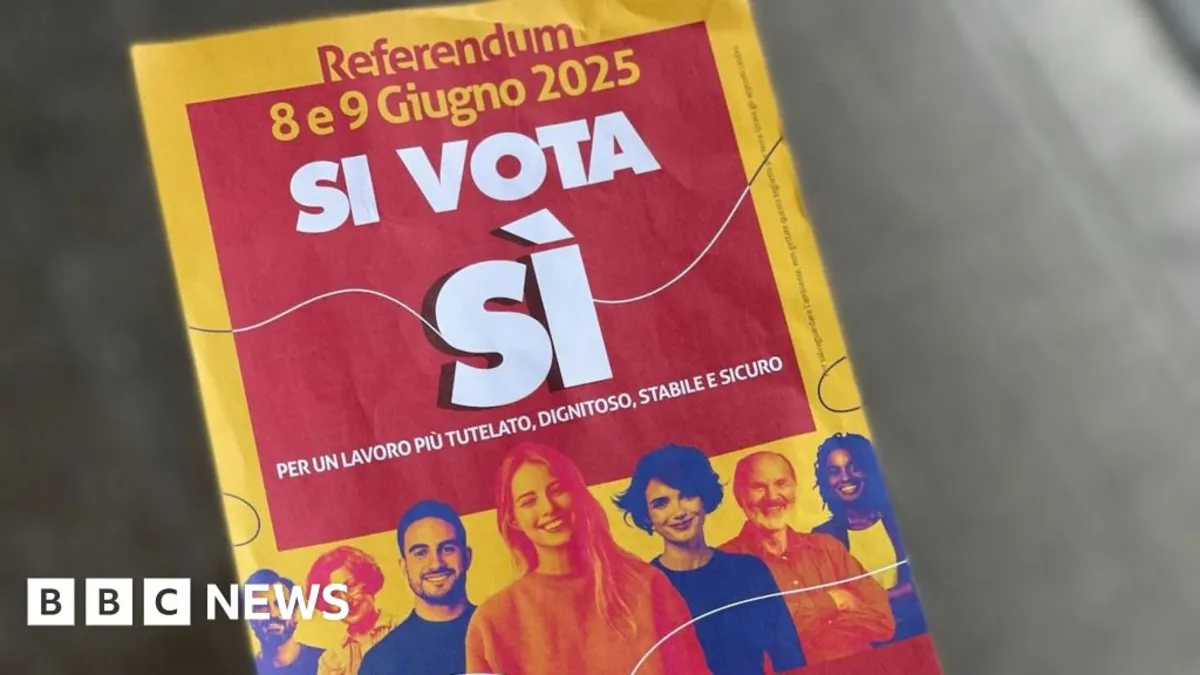
In a pivotal moment for Italy, the upcoming Italian citizenship referendum has ignited a national conversation about identity and inclusion. Reporting from Rome, BBC correspondent Sarah Rainsford shares the story of Sonny Olumati, a 39-year-old dancer and activist who embodies the struggles faced by many long-term residents in Italy. Although born and raised in Rome, Sonny is recognized only as Nigerian, a status defined by his passport rather than his lived experience. "I've been born here. I will live here. I will die here," Sonny expresses in his unique blend of Italian-English, reflecting on the profound impact of not having citizenship. "Not having citizenship is like... being rejected from your country. And I don't think this is a feeling we should have."
Sonny, alongside others, has been campaigning vigorously for a Yes vote in the referendum scheduled for Sunday and Monday. The proposed change aims to reduce the time required to apply for Italian citizenship from 10 years to just 5. This reform seeks to align Italy's citizenship process with that of most other European nations, highlighting the urgent need for a more inclusive approach in a country facing a rapidly shrinking and aging population.
However, the response from the government has been mixed. Giorgia Meloni, Italy's hard-right prime minister, has publicly declared her intention to boycott the vote, asserting that the current citizenship law is already "excellent and very open." Allies of her party are even encouraging Italians to spend their days at the beach rather than at polling stations.
The issue of who qualifies as Italian remains a sensitive topic, especially given the influx of migrants and refugees arriving in Italy each year. These individuals often seek asylum after perilous journeys across the Mediterranean Sea. While the Meloni government has focused on reducing illegal immigration, this referendum specifically targets long-term residents who have legally migrated to Italy for work. The goal is clear: to expedite the citizenship process without altering the stringent criteria that include language proficiency and a clean criminal record.
Carla Taibi, a representative from the liberal party More Europe, emphasizes that the reform is limited in scope. "This is about changing the perception of long-term residents. They are not strangers anymore but part of our society," she argues. The proposed reform could potentially benefit up to 1.4 million individuals who have been living, studying, and contributing to the Italian economy.
For many like Sonny, the lack of citizenship has real-world consequences. Without it, he cannot apply for public sector jobs and has faced significant challenges in obtaining essential documents, like a driving license. His experience on the reality TV show Fame Island was marred by bureaucratic obstacles, causing him to arrive late to set due to paperwork delays.
Despite the challenges, the government has largely ignored the implications of the referendum, with state-run media offering little coverage. This lack of attention raises concerns about the potential for low voter turnout, which is essential for the referendum to be valid. Professor Roberto D'Alimonte from Luis University in Rome speculates that the government may be intentionally downplaying the referendum to avoid reaching the necessary voter turnout threshold.
Individuals like Insaf Dimassi, who identifies as Italian without citizenship, share similar sentiments of frustration. Growing up in Italy, she feels deeply pained by the lack of recognition. Her family’s journey to citizenship was fraught with challenges, and she now finds herself waiting to apply for her own citizenship. "Not being allowed to vote or be represented is being invisible," she laments, reflecting on her aspirations to contribute to her community.
On the eve of the referendum, students in Rome made a passionate call for civic engagement by writing "Vote 'YES' on the 8th and 9th of June" in large letters on the cobblestones of a city square. However, despite their efforts, the chances of surpassing the 50% turnout threshold remain uncertain due to the government's boycott and the lack of a substantial No campaign.
Regardless of the referendum's outcome, Sonny emphasizes that this vote is just the beginning of a larger conversation about the place of long-term residents in Italy. "Even if they vote 'No', we will stay here and think about the next step," he states, underscoring the resilience and determination of those advocating for change. The ongoing dialogue about Italian citizenship continues to challenge the narrative surrounding identity and belonging in modern Italy.
As the referendum draws near, the nation watches closely, recognizing that the outcome could redefine what it means to be Italian in a rapidly changing world.